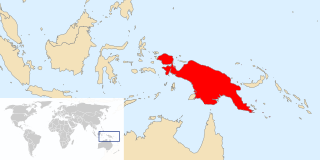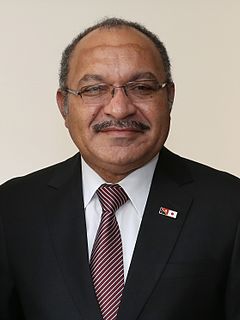
The politics of Papua New Guinea takes place in a framework of a parliamentary representative democratic multi-party system, whereby the Prime Minister is the head of government. Papua New Guinea is an independent Commonwealth realm, with a governor-general, nominated by the National Parliament, acting as head of state. Executive power is exercised by the government. Legislative power is vested in both the government and parliament.

New Britain is the largest island in the Bismarck Archipelago of Papua New Guinea. It is separated from the island of New Guinea by the Dampier and Vitiaz Straits and from New Ireland by St. George's Channel. The main towns of New Britain are Rabaul/Kokopo and Kimbe. The island is roughly the size of Taiwan. While the island was part of German New Guinea, it was named Neupommern.

The Papuan languages are the non-Austronesian and non-Australian languages spoken on the western Pacific island of New Guinea, and neighbouring islands, by around 4 million people. It is a strictly geographical grouping, and does not imply a genetic relationship. The concept of Papuan peoples as distinct from Melanesians was first suggested and named by Sidney Herbert Ray in 1892.

Jayapura is the capital and largest city of the Indonesian province of Papua. It is situated on the island of New Guinea, on Yos Sudarso Bay. It covers an area of 935.92 km2 (361.36 sq mi), and borders Jayapura Regency to the west, Keerom Regency to the south, the nation of Papua New Guinea to the east, and the Pacific Ocean to the north. It had a population of 256,705 at the 2010 Census; the latest official estimate is 315,872.

Samarai is an island and former administrative capital in Milne Bay Province, Papua New Guinea.

The law of Papua New Guinea consists of the Constitution, ordinary statutes enacted by Parliament or adopted at Independence from overseas and judge-made law.

The Supreme Court of Papua New Guinea has been the highest court of Papua New Guinea since 16 September 1975, replacing the pre-Independence Supreme Court and the overseas appellate tribunals from 1902 to 1975 of the High Court of Australia and the Judicial Committee of the Privy Council. Judges of the pre-Independence Supreme Court automatically became the justices of the National Court and accordingly among the pool of judges available to be empanelled as a Supreme Court bench. "The National and Supreme Court of Papua New Guinea is composed of the Chief Justice, Deputy Chief Justice and 21 Judges."
The Sepik languages are a family of some 50 Papuan languages spoken in the Sepik river basin of northern Papua New Guinea, proposed by Donald Laycock in 1965 in a somewhat more limited form than presented here. They tend to have simple phonologies, with few consonants or vowels and usually no tones.
The APNG-2 submarine communications cable was constructed to link Papua New Guinea directly to Australia and indirectly to New Zealand and the rest of the world, and has been in service from late 2006.
Ivo Cappo was a Papua New Guinean court magistrate. He was originally from Laiagam District in the Enga Province of Papua New Guinea.

New Guinea is a large island separated by a shallow sea from the rest of the Australian continent. It is the world's second-largest island, after Greenland, covering a land area of 785,753 km2 (303,381 sq mi), and the largest wholly or partly within the Southern Hemisphere and Oceania.
Nigel Robert Agonia, born 11 May 1948 at Gabutu, Port Moresby, Papua New Guinea (PNG) is a former cricketer and the former chairman of the Porgera Environmental Advisory Komiti (PEAK).
Sir Albert Maori Kiki was a Papua New Guinea politician. He was one of the founders of the Pangu Party, which demanded 'home rule leading to eventual independence' for New Guinea. Born in the Kerema district on the Papuan coast, he was brought up in the Protestant faith in the church of the London Missionary Society. In 1958 he married Elizabeth a Roman Catholic, in one of the first mixed marriages in the Territory. Albert had been one of a small group of promising students selected by Dr John Gunther, Director of Health, to study medicine at the Suva Medical School. When he failed his medical exams and was likely to be recalled, he switched his studies to become a pathology technician. On completion of his course, he returned and worked as a technician in the laboratory operated by Dr Price in the Native Hospital at Ela Beach. His autobiography, Ten Thousand Years in a Lifetime, was published in 1968.

Peter Charles Paire O'Neill, CMG is a Papua New Guinean politician and the Prime Minister of Papua New Guinea since 2011.
Beach volleyball at the 2015 Pacific Games in Port Moresby, Papua New Guinea was held on July 13–18, 2015.










